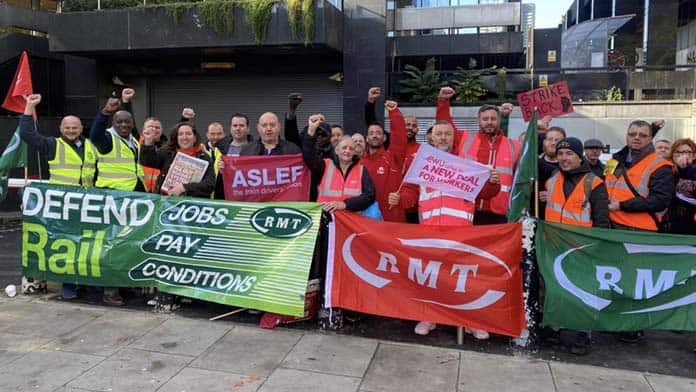The soaring cost of living in Britain has triggered a significant wave of strikes, alongside bitter resistance to a Tory government that is in disarray.
Liz Truss has been Prime Minister for just over a month and her government is already in an extraordinary crisis, after Boris Johnson’s already toxic rule and his chaotic exit from power.
But Truss and Chancellor Kwasi Kwarteng are even deeper in trouble. They had to withdraw tax cuts for the rich they had proclaimed as gloriously correct just days before and had defended hours previously. Kwarteng, landed with being the face of surrender, then gave one of the shortest speeches at a Tory conference delivered by a chancellor in modern times.
The slogan for the conference was “Getting Britain Moving”. The widely-expected destination is Truss’s removal before the next general election—or by Christmas.
Why has this happened? Certainly the financial markets and squads of rebellious Tory MPs had rejected the mini-budget, meaning it faced defeat in parliament. However, bankers and MPs will still fall into line if they think they can get away with vicious measures not leading to a fightback. The government can only ram through more brutal measures if the opposition is weak.
But the Tories knew they would face a social revolt by millions if they did nothing about gas and electricity prices. That’s why they came forward with—still inadequate—ways to limit bills. The government will subsidise bills in order to set a price cap in the face of price rises that were expected to see gas bills up by 140 per cent in a year.
But the Tories realised—too late—that tax handouts to the top 1 per cent would haunt them as a symbol of gross inequality.
Inflation is up 12.3 per cent in the past year and is still expected to go higher, causing a sharp drop in living standards for ordinary people.
Everyone whose wages and benefits are being cut would remember it. And most importantly a resurgence of strikes has changed the atmosphere. The working class is no longer just soaking up the punishment.
Strike wave
Thousands of rail workers have already taken eight days of strike action in the face of a government assault involving cuts to jobs and conditions. At Royal Mail, 115,000 postal workers have announced 19 further days of strike action between October and December. Bosses there forced through an appalling 2 per cent pay rise earlier this year.
At British Telecom and its subsidiary Openreach, 40,000 workers are also fighting a massive pay cut, with four days of strike action planned in October after four strikes earlier this year.
Wharfies in Liverpool and Felixstowe went on strike together after rejecting a pay offer of 7 per cent. Inspirationally, wharfies in Southampton refused to handle work that had been diverted to the south coast port from Liverpool.
Non-unionised workers at Amazon warehouses also staged walkouts or sit-ins in August after hearing that they would receive only miserable pay rises.
There have also been strikes in higher education colleges, on the buses, by workers on North Sea oil rigs, and even by criminal barristers. Buses drivers in London won an 11 per cent pay rise, up from an initial offer of 4 per cent.
Tory cuts
The Tories are now preparing a new round of budget cuts that may include cuts to welfare and will certainly try to starve the health system and education in an effort to soothe the markets, after their previous plans saw the British pound plummet in value, threatening a financial crisis.
There may be further cuts to public sector jobs, with predictions of 220,000 job cuts.
There are also plans to unveil new anti-union laws.
Strikes are the more powerful weapon workers have. In the face of this assault, the level of action needs to keep increasing.
On Saturday 1 October rail, mail and waterfront workers struck together, with 175,000 workers joining the action and thousands more taking part in marches and rallies to support them and oppose the government.
The argument to strike together and demonstrate together took a step forward as a result. There will need to be far more strikes and more united action in the coming months.
Workers can not only fight for pay and conditions but be the sharpest weapon against all the Tory assaults. An escalating wave of strike action and resistance is the way to drive out the Tory government and defend living standards.
This fighting spirit and willingness to walk out and take solidarity action should be an inspiration for workers here in Australia.
Adapted from Socialist Worker UK






